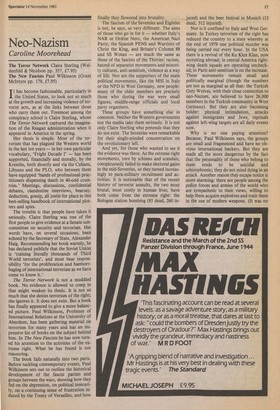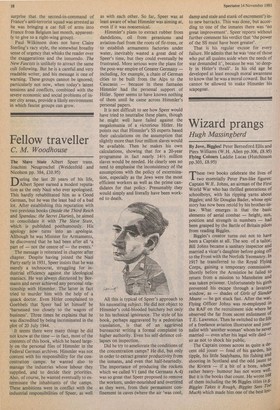Neo-Nazism
Caroline Moorehead
The Terror Network Claire Sterling (Weidenfeld & Nicolson pp. 357, £7.95) The New Fascists Paul Wilkinson (Grant McIntyre pp. 179, £7.95) It has become fashionable, particularly in the United States, to look not so much at the growth and increasing violence of terrorist acts, as at the links between those who carry them out. Foremost among the conspiracy school is Claire Sterling, whose The Terror Network captured the imagination of the Reagan administration when it appeared in America in the spring.
Her thesis is simple. Most of the terrorism that has plagued the Western world in the last ten years — in her own particular vocabulary, 'Fright Decade I' — has been supported, financially and morally, by the Kremlin, both directly and via the 'Cubans, Libyans and the PLO, who between them have equipped 'bands of professional practitioners dispensing death in 40-odd countries.' Meetings, discussions, confidential debates, clandestine interviews, hearsay, deduction, gossip, all jostle for place in this best-selling handbook of international plotters and spies.
The trouble is that people have taken it seriously. Claire Sterling was one of the first people to give evidence at a Senate subcommittee on security and terrorism. Her words have, on several occasions, been echoed by the Secretary of State, Alexander Haig. Recommending her book warmly, he has declared publicly that the Soviet Union is 'training literally thousands of Third World terrorists', and must bear responsibility 'for the proliferation and haemorrhaging of international terrorism as we have come to know it.'
The Terror Network is not a muddled book. No evidence is allowed to creep in that might weaken its thesis. It is not so much that she denies terrorism of the right; she ignores it. It does not exist. But a book has finally appeared to give a more balanced picture. Paul Wilkinson, Professor of International Relations at the University of Aberdeen, has been gathering material on terrorism for many years and has an impressive list of books on the subject behind him. In The New Fascists he has now turned his attention to the activities of the extreme right. What he has found is not reassuring.
The book falls naturally into two parts. Before tackling contemporary events, Paul Wilkinson sets out to outline the historical development of the fascist parties and groups between the wars, showing how they fed on the depression, on political insecuri Ity, on a continuing sense of frustration induced by the Treaty of Versailles, and how The fascism of the Seventies and tighties is not, he says, so very different. The aims of those who go in for it — whether Italy's NAR or Ordine Nero, the American Nazi Party, the Spanish PENS and Warriors of Christ the King, and Britain's Column 88 and SS Wotan — are much the same as those of the fascists of the Thirties: racism, hatred of separatist movements and minority cultures, anti-semitism, violence as a way of life. Nor are the supporters of the main political movements, like the MSI in Italy or the NPD in West Germany, new people: many of the older members are precisely those who during the war were small figures, middle-range officials and local party organisers.
These groups have something else in common. Neither the Western governments nor the media take them seriously. It is not only Claire Sterling who pretends that they do not exist. The Seventies were remarkable for their single-minded concentration on the revolutionary left.
And yet, for those who wanted to see it the evidence was there. As the extreme right movements, torn by schisms and scandals, conspicuously failed to make electoral gains in the mid-Seventies, so they turned increasingly to para-military recruitment and activities. It is noticeable that of the recent history of terrorist assaults, the two most brutal, most costly in human lives, have both come from the extreme right: the Bologna station bombing (85 dead, 260 in jured) and the beer festival in Munich (13 dead, 312 injured).
Nor is it confined to Italy and West Germany. In Turkey terrorism of the right has reduced the country to a state whereby at the end of 1979 one political murder was being carried out every hour. In the USA there is a revival of the Ku Klux Klan, now recruiting abroad; in central America rightwing death squads are operating unchecked; in Paris anti-semitism is on the increase. These movements remain small and politically marginal (though the numbers are not as marginal as all that: the Turkish Grey Wolves, with their close connection to neo-Nazism, are believed to have 26,000 members in the Turkish community in West Germany). But they are also becoming bolder: physical intimidation, attacks against immigrants and Jews, reprisals against left-wing targets are all daily events now.
Why is no one paying attention? Because, Paul Wilkinson says, the groups are small and fragmented and have no obvious international backers. But they are made all the more dangerous by the fact that the personality of those who belong to them tends to be suicidal and schizophrenic; they do not mind dying in an attack. Another reason they escape notice is more alarming: there are people among the police forces and armies of the world who are sympathetic to their views, willing to help them acquire explosives and train them in the use of modern weapons. (It was no surprise that the second-in-command of France's anti-terrorist squad was arrested as he was bringing a car full of arms into France from Belgium last month, apparently to give to a right-wing group).
Paul Wilkinson does not have Claire Sterling's racy style, the somewhat breathy sense of urgency that whisks the reader over the exaggerations and the innuendo. The New Fascists is unlikely to attract the same cult following. But he is a careful and very readable writer, and his message is one of warning. These groups cannot be ignored; particularly not now, when today's latent tensions and conflicts, combined with the severe economic and social problems of inner city areas, provide a likely environment in which fascist groups can grow.



































 Previous page
Previous page